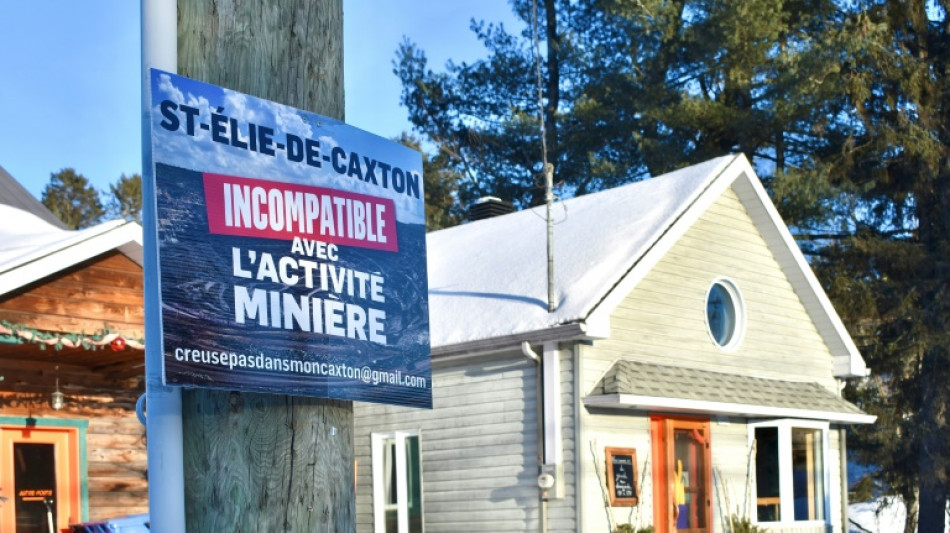
-
 'Legendary' Eubank Jr beats Benn in grudge bout
'Legendary' Eubank Jr beats Benn in grudge bout
-
Thunder sweep past Grizzlies into NBA playoffs 2nd round, Cavs on brink

-
 South Korea's Ryu and Japan's Saigo share LPGA Chevron lead
South Korea's Ryu and Japan's Saigo share LPGA Chevron lead
-
Canada leaders make closing pitches in campaign upended by Trump

-
 De Bruyne's Man City exit 'so difficult' for Guardiola
De Bruyne's Man City exit 'so difficult' for Guardiola
-
'No regrets' for Amorim over Man Utd move

-
 Lyon and Strasbourg win to close in on Europe, Montpellier relegated from Ligue 1
Lyon and Strasbourg win to close in on Europe, Montpellier relegated from Ligue 1
-
Toulouse thrash Castres as Top 14 pursuers stumble

-
 Djokovic crashes to nervous Arnaldi in Madrid opener, Swiatek advances
Djokovic crashes to nervous Arnaldi in Madrid opener, Swiatek advances
-
Olympic champs Russell, Davis-Woodhall win at Drake Relays

-
 Browns end Sanders long draft slide
Browns end Sanders long draft slide
-
Cavs crush Heat, on brink of NBA playoff sweep

-
 Fire rages after major blast at Iran port kills 8, injures hundreds
Fire rages after major blast at Iran port kills 8, injures hundreds
-
Kiwi Beamish wins Penn Relays 1,500m crown with late kick

-
 Mbappe on Real Madrid bench for Clasico Copa del Rey final
Mbappe on Real Madrid bench for Clasico Copa del Rey final
-
England survive France fightback to seal Women's 6 Nations slam

-
 Palace sweep past Villa to reach FA Cup final
Palace sweep past Villa to reach FA Cup final
-
CAF appoint Moroccan Lekjaa first vice-president

-
 Major blast at Iran port kills 5, injures hundreds
Major blast at Iran port kills 5, injures hundreds
-
Rodgers vows to stay with Celtic after fourth successive Scottish title

-
 Ipswich relegated as Newcastle, Chelsea boost top five bids
Ipswich relegated as Newcastle, Chelsea boost top five bids
-
Canada leaders make final pitches in campaign upended by Trump

-
 Mullins -- Ireland's national training treasure
Mullins -- Ireland's national training treasure
-
US, Iran say progress in 'positive' nuclear talks

-
 Mullins emulates O'Brien with second successive trainer's title
Mullins emulates O'Brien with second successive trainer's title
-
Ipswich relegated after one season in Premier League

-
 Just Stop Oil activist group holds final march
Just Stop Oil activist group holds final march
-
Djokovic crashes to nervous Arnaldi in Madrid opener

-
 Syria's Kurds demand 'democratic decentralised' Syria
Syria's Kurds demand 'democratic decentralised' Syria
-
Leverkusen win to delay Bayern and Kane's title party

-
 Buenos Aires farewells native pontiff with tears and calls to action
Buenos Aires farewells native pontiff with tears and calls to action
-
Turkey's opposition says Erdogan's canal plan behind latest arrests

-
 Maresca hails 'nasty' Chelsea as top five bid stays alive
Maresca hails 'nasty' Chelsea as top five bid stays alive
-
Trump raises Putin doubts after Zelensky talks at pope's funeral

-
 Major blast at Iran port kills 4, injures hundreds
Major blast at Iran port kills 4, injures hundreds
-
Napoleon's sword to be sold at auction in Paris

-
 Iran, US discuss nuclear deal in third round of talks
Iran, US discuss nuclear deal in third round of talks
-
Buenos Aires farewells native pontiff with call to action

-
 Warholm sets hurdles world record at Diamond League, Holloway shocked
Warholm sets hurdles world record at Diamond League, Holloway shocked
-
US students 'race' sperm in reproductive health stunt

-
 Wikileaks founder Assange joins crowds for pope funeral
Wikileaks founder Assange joins crowds for pope funeral
-
Leader Marc Marquez claims Spanish MotoGP sprint victory

-
 Celtic win fourth successive Scottish Premiership title
Celtic win fourth successive Scottish Premiership title
-
Jackson ends drought as Chelsea boost top five push

-
 Warholm sets 300m hurdles world record in Diamond League opener
Warholm sets 300m hurdles world record in Diamond League opener
-
Major blast at south Iran port kills 4, injures hundreds

-
 Russia says retook Kursk from Ukraine with North Korean help
Russia says retook Kursk from Ukraine with North Korean help
-
Francis laid to rest as 400,000 mourn pope 'with an open heart'

-
 Trump, Zelensky meet on sidelines of pope's funeral
Trump, Zelensky meet on sidelines of pope's funeral
-
'Shared loss': Filipino Catholics bid Pope Francis farewell


In Canada's Quebec, residents miffed over mining boom
Canada's Quebec province is rich with minerals needed for everything from electric cars to cell phones, but residents living atop the potential windfall are worried their backyards will be dug up -- and they won't get a dime.
In recent months, tens of thousands of mining exploration permits have been issued in the province amid a global rush for critical and strategic minerals such as graphite, lithium, zinc, nickel and cobalt.
But under provincial mining exploration rules, subsoil in Quebec does not belong to landowners.
In Saint-Elie-de-Caxton, a town of 2,000 people about halfway between Montreal and Quebec City, residents are fed up. Signs around town proclaim "Saint-Elie, incompatible with mining activity" or "Don't Dig in my Caxton."
"We are at war, says Gilbert Guerin, spokesman for the "Don't Dig in my Caxton" committee, pointing to a map delineating exploration claims that have effectively parceled off the town for future mines.
In Quebec, it only takes a few clicks on a website and about Can$75 (US$55) to stake a mining claim covering up to 100 hectares (250 acres) -- an opportunity open to locals and foreigners alike.
"I bought here. I thought I would be sovereign in my own home, but I came to understand that what's underground did not belong to me," says Yvan Lafontaine, surveying his property in the neighboring village of Saint-Mathieu-du-Parc from atop an observation tower he had built.
When Lafontaine learned that a company had acquired the mining rights to the subsoil beneath his land, what the nature lover calls his little "paradise," he fought back by staking 12 claims surrounding the property.
Currently, more than 350,000 claims have been registered, covering 10 percent of Quebec. The southern areas of the province -- where most of the population lives -- is the most sought after.
According to an AFP analysis of government data, the number of claims issued significantly increased from September 2022 to the end of February 2024, with about 160,000 granted -- a 140 percent increase over the previous 18-month period.
- 'Wild West' -
For Saint-Elie resident Julie Hamelin, the mining exploration regulations in Quebec are "outdated."
"It's something out of the Wild West, this way of staking claims," she said, urging provincial authorities to protect inhabited lands from mining.
Guerin, a former civil servant, says he is worried about the "irreversible consequences" that a mining project would have, particularly on the region's groundwater.
To try to discourage mining companies from moving in, residents of Saint-Elie-de-Caxton spent thousands of dollars to buy up more than 220 exploration claims around the village.
Faced with growing public discontent, the Quebec government has announced it intends to modernize its mining law, and insisted in an email to AFP "that no exploration can be carried out without the consent of the owner of private land."
But mining companies definitely are eyeballing Quebec's potential for resources extraction.
"There is a lot of graphite in Quebec. It could be the most important reserve in the world," says Hugues Jacquemin, chief executive of Northern Graphite.
"We absolutely must develop this sector because it is essential for the manufacture of batteries and electric vehicles," he told AFP during a visit to a mine at Lac-des-Iles, 260 kilometers (160 miles) north of Montreal.
Canada is seeking to develop a battery supply chain independent from China, which has until now dominated the market in these critical minerals.
The development of the electric vehicle sector is a priority for both Quebec and Canada, which boasts of being one of the only countries in the world to have all of the necessary minerals to produce batteries.
But in Saint-Elie-de-Caxton and its surrounding areas, not all citizens are on board with the official plans.
"I don't think we should go in this direction," says Hamelin. "The solution is downscaling by using what we already have."
L.Miller--AMWN



